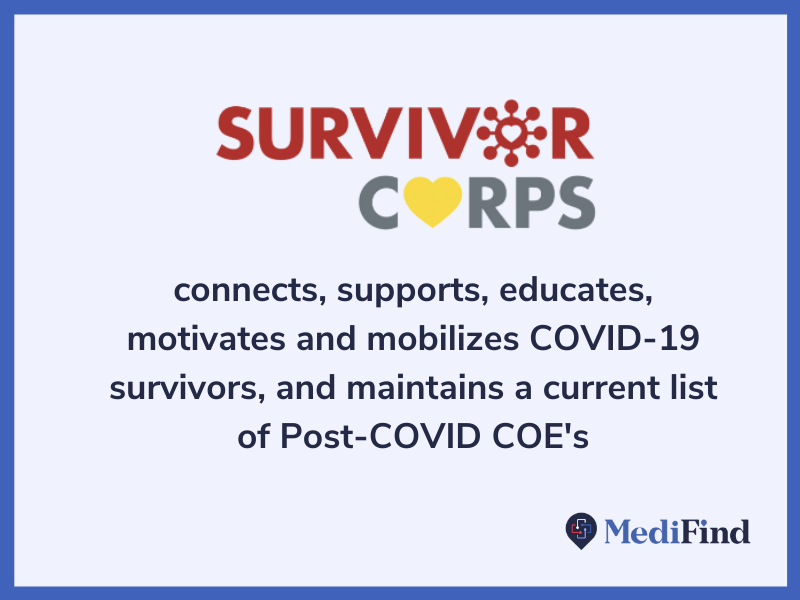Well over a year into the COVID-19 pandemic, we’re all deeply familiar with the symptoms of COVID-19 infection. Shortness of breath, fever, loss of smell, and the list goes on. The acute phase of infection with SARS-CoV-2 can range from asymptomatic to grueling. Most people recover fully. But unfortunately, many don’t.
It goes by many names: Long Haul COVID, Long COVID, Long Term COVID, Post-COVID Syndrome, Post-Acute COVID Syndrome, or more officially from NIH, Post-Acute Sequelae of SARS-CoV-2 Infection (PASC). Sufferers, often referred to as “COVID long haulers,” report a wide variety of symptoms, including fatigue, shortness of breath, brain fog, sleep disorders, fevers, gastrointestinal symptoms, anxiety, and depression, which can persist for months and can range from mild to incapacitating.
Jump to:
Long Haul COVID Symptoms and Prevalence
The Echo-Pandemic of Long Haul COVID
- Long Haul COVID Support Groups
- Long Haul COVID Registries
- Long Haul COVID Scientific Research
- Post-COVID Centers of Excellence
Stay Up to Date with Long Haul COVID Treatment Progress
Long Haul COVID Symptoms and Prevalence
Surprisingly, the likelihood that a person will have Long Haul COVID symptoms does not seem to be tied to the severity of their initial COVID infection. A recent study from Northwestern Memorial Hospital in Chicago found that 85% of people who had a mild infection (were never sick enough to become hospitalized) experienced four or more neurological issues like brain fog, headaches, tingling, muscle pain and dizziness. Another analysis of electronic medical records in California found that of people with initial asymptomatic COVID-19 infection, 32% reported troubling after-effects weeks and months later. This pattern also appears to hold true in children, with the New York Times reporting: “Lingering physical, mental and neurological symptoms are affecting children as well as adults, including many who had mild reactions to the initial coronavirus infection.”

A recent large-scale study suggests that within the six months following diagnosis, as many as one third of COVID-19 sufferers suffer from “brain disease,” which includes both psychological (mental health) and neurological symptoms. The most common diagnosis was anxiety, followed by mood disorders. While the severity of neurological effects was higher in patients that had been hospitalized, these symptoms remained common in those who were not hospitalized. Another large study found that half of patients were still experiencing at least one symptom 12 months post-infection.
It is not yet known whether vaccinated people who have had a breakthrough infection can develop Long Haul COVID. Based on a recent small-scale study, the New York Times reports: “the fact that one in five of the health care workers who had breakthrough infections still had lingering symptoms after six weeks appears to be the first indication from a peer-reviewed study that long Covid is possible after a breakthrough infection.”
The Echo-Pandemic of Long Haul COVID

Long Haul COVID is not rare. According to a letter published by Harvard Medical School, research shows that 50-80% of patients continue to have bothersome symptoms three months after the onset of COVID-19.
The most common symptoms are fatigue, body aches, shortness of breath, difficulty concentrating, inability to exercise, headache, and difficulty sleeping. These long-haulers may not return to a pre-infection level of health or function even six months after onset.
The rise of Long Haul COVID could be characterized as an echo-pandemic, the after-shock of widespread acute COVID-19 infection around the world.
Physicians and researchers have compared this post-COVID syndrome to myalgic encephalomyelitis (also known as chronic fatigue syndrome and abbreviated ME/CFS), a long-term but poorly understood disease causing fatigue, malaise, sleep interruptions, difficulty concentrating, and dizziness. ME/CFS can be brought on by other viral infections, such as with the Epstein-Barr virus. Although researchers aren’t sure yet, one hypothesis is that this constellation of symptoms is the result of lasting organ inflammation or damage from COVID-19 infection, most often to the lungs, heart, kidney, and brain. Other research suggests that many patients with Long Haul COVID have symptoms similar to Postural Orthostatic Tachycardia Syndrome (POTS), to the point that researchers recommended that all COVID-19 patients with rapid heartbeat, dizziness, brain fog or fatigue “should be screened for POTS.”
These symptoms can be debilitating. Forbes published a piece noting that post infection symptoms of COVID-19 are increasing the rate of suicide, including mention of the recent suicide of Texas Roadhouse CEO Kent Taylor as a result of severe post-COVID symptoms.
Ongoing research continues to investigate the causes of Long Haul Covid, identifying four factors that may increase the odds of experiencing these long-term symptoms:
1. Level of coronavirus RNA in the blood early in the infection
2. Presence of certain autoantibodies
3. Reactivation of Epstein-Barr virus (“a virus that infects most people, often when they are young, and then usually becomes dormant”)
4. Having Type 2 diabetes
Given how widespread COVID-19 infection has been in America, and around the world, we’re potentially just starting to see the first members of a very large group of people with persistent symptoms who will need ongoing, and sometimes intensive, medical attention. “28 million people in the United States have had COVID,” said the NIH’s director, Dr. Francis Collins. “If even 1 percent of them have chronic, long-term consequences, that’s a whole lot of people. We need to find out everything we can about how to help them.”
Hope for COVID Long Haulers
While current management strategies for Long Haul COVID symptoms may seem bleak, there are a number of initiatives underway to find answers, interventions, and treatments.
Congress recently approved the NIH PASC initiative, which dedicates $1.15B to the study of long-term symptoms of COVID-19. The aim is to learn more about how SARS-CoV-2 may lead to such widespread and lasting symptoms, and to develop ways to treat or prevent these conditions. The Biden administration also announced in July 2021 that “long COVID” patients will be covered by the Americans with Disabilities Act, giving Americans severely impacted by Long Haul COVID access to resources and rights backed by the federal government.
Long Haul COVID Support Groups
Driven by the growing number of people affected by Long Haul COVID, many of whom face skepticism from their doctors and the healthcare system about the validity of their symptoms, a number of Long Haul COVID groups have arisen across social media to help sufferers support each other. Facebook estimates that more than 4.5 million people have joined one of over 4,000 US-based COVID-19 support groups.

One group that has gathered a particularly large audience as well as national attention is Survivor Corps. The organization is “one of the largest and fastest growing grassroots movements connecting, supporting, educating, motivating and mobilizing COVID-19 Survivors to support all medical, scientific and academic research, help stem the tide of this pandemic and assist in the national recovery.”
Founded by Diana Berrent, who had COVID-19, Survivor Corps maintains a Facebook group and an extremely helpful website containing a variety of resources, from the latest news coverage, to a map of Post-COVID Care Centers, to physician analysis of emerging research studies.
For those who are unable to travel to a dedicated Long Haul COVID center, the Pulmonary Wellness Foundation, a New York City-based nonprofit organization with deep experience treating cardiovascular, pulmonary and complex medical patients, even launched the first COVID Rehabilitation and Recovery Bootcamp. This course offers free online rehab for COVID-19 survivors and long-haulers.
Long Haul COVID Registries
Public health registries identify and follow people with a disease over time to determine the long-term impact of that disease. A core registry tied to the NIH PASC initiative is INSPIRE (Innovative Support for Patients with SARS COV-2 Infections Registry). INSPIRE is a large-scale clinical trial that is enrolling 3,600 patients who had confirmed COVID-19 infection, as well as another 1,200 participants who have similar symptoms but did not have COVID-19. The study is primarily looking for signs of myalgic encephalomyelitis (chronic fatigue syndrome). There are multiple enrollment sites across the US through a network of health systems including:
- Rush University Medical Center
- Yale University in New Haven, CT
- University of Washington in Seattle, WA
- Thomas Jefferson University in Philadelphia, PA
- University of California, Los Angeles (UCLA) in Los Angeles, CA
- University of California, San Francisco (UCSF) in San Francisco, CA
- University of Texas Southwestern Medical Center in Dallas, TX
- The University of Texas Health Science Center in Houston, TX
There are also a number of registries that have been launched by patients and communities for COVID-19 and Long Haul COVID, such as You + ME Registry.
Participating in a registry can help researchers better understand Long Haul COVID and identify the most promising treatments and management strategies more quickly.
Long Haul COVID Scientific Research
Within the scientific research community, NIH has also launched the National COVID Cohort Collaborative (N3C) to pull together data from millions of patients to enable the large-scale study of COVID-19 and Long Haul COVID.
Post-COVID Centers of Excellence
A network of Centers of Excellence (COE’s) specifically geared to the study and management of Long Haul COVID is emerging across the country. Fast Company highlighted one such center in New York City. Non-profit Survivor Corps maintains an up-to-date map of Post-COVID Care Centers (PCCCs), labeling them as Multidisciplinary Long-Term Recovery (the most comprehensive), Rehabilitation and Therapy (focused on rehabilitation), or Acute COVID-19 Recovery (focused on improved function after severe illness or hospitalization, often in an in-patient setting).
NBC News has also published an interactive map of 80 “post-COVID” clinics (as of March 1, 2021) in which they’ve identified across the US, including but not limited to:
- Mount Sinai Center for Post-COVID Care and Columbia University Irving Medical Center Post-COVID virtual rehab program in New York, NY
- Cedars-Sinai Post COVID-19 Diagnostics and Therapeutics Program in Los Angeles, CA
- The Memorial Hermann Rehabilitation Network COVID-19 Rehabilitation Program and UTHealth COVID-19 Center of Excellence Post-COVID Adult & Pediatric Care in Houston, TX
- UCSF OPTIMAL Clinic in San Francisco, CA
- Stanford Health Care Post-Acute COVID Center in Atherton, CA
- Post-COVID Rehabilitation and Recovery Clinic at Harborview Medical Center in Seattle, WA
- National Jewish Health Center for Post-COVID-19 Care and Recovery in Denver, CO
- Penn Medicine Post-COVID Assessment and Recovery Clinic in Philadelphia, PA
- Northwestern Memorial Comprehensive COVID-19 Center and Post-COVID Neurological Center in Chicago, IL
- Piedmont Pulmonary COVID Recovery Clinic in Atlanta, GA
- University of Miami Covid-19 Heart Program in Miami, FL
- Johns Hopkins Medicine Post Acute COVID Team and Kennedy Krieger Institute – Pediatric Post COVID-19 Rehabilitation Clinic in Baltimore, MD
Mapping the Emerging Long Haul COVID Centers Across the United States


Stay Up to Date with Long Haul COVID Treatment Progress

Experts, treatments, and data about Long Haul COVID will continue to emerge as more research is done. MediFind is here to help you stay on top of it all.
Find Long Haul COVID Experts Near You
MediFind specializes in identifying the leading experts for thousands of health conditions. As new research continues to be published about Long COVID, we’ll be constantly updating this database of Long Haul COVID experts to help you find the best care near you. In the meantime, seek out care from your primary doctor or look into your closest Post-COVID Care Center.
Long COVID Treatment: Clinical Trials and Latest Research
While these treatment centers gear up, researchers aren’t waiting on the sidelines. There are a number of ongoing global clinical trials in progress to better understand Long Haul COVID. We’ll be maintaining an always-up-to-date database of clinical trials and research publications related to Long COVID as they emerge here at MediFind. Given that both COVID-19 and Long Haul COVID are still so new, this will be a rapidly evolving space.
We’re all about helping you find better care, faster. Long Haul COVID will be with us for a long time, and we’re committed to helping you get the care you need along the way.



